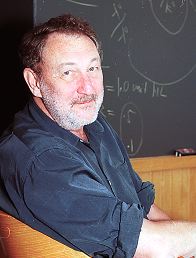Three faculty members transfer to emeritus status
Princeton NJ -- Three faculty members were transferred to emeritus status in recent action by the Board of Trustees. They are: Michael Doyle, the Edwards S. Sanford Professor of Politics and International Affairs, effective Oct. 1, 2003; W. Jason Morgan, the Knox Taylor Professor of Geography and professor of geophysics, effective Feb. 1, 2004; and Martin Weigert, the Henry L. Hillman Professor in the Life Sciences and professor of molecular biology, effective Sept. 1, 2003.
Doyle joined the faculty in 1987 after teaching at Harvard, Johns Hopkins and the University of Warwick. He also taught at Princeton from 1977 to 1984. The recipient of bachelor's and doctoral degrees from Harvard, he was named to Princeton's Sanford professorship in 1999. Doyle was director of the Center of International Studies in the Woodrow Wilson School of Public and International Affairs from 1997 to 2001. An expert on international relations theory and comparative peacekeeping, he served as assistant secretary-general and special adviser to United Nations Secretary-General Kofi Annan from 2001 to 2003 while on a public service leave from the University. He also has been vice president of the International Peace Academy in New York and a member of advisory committees of the U.N. High Commissioner for Refugees and the Lessons-Learned Unit of the U.N. Department of Peacekeeping Operations. In 2001, he was elected a fellow of the American Academy of Arts and Sciences. Doyle has published widely on international issues and is the author of numerous articles in scholarly journals and several books, including "Empires," "U.N. Peacekeeping in Cambodia" and "Ways of War and Peace." This fall, he was appointed the Harold Brown Professor of U.S. Foreign and Security Policy at both the School of Law and the School of International Affairs of Columbia University, and he continues to work with Secretary-General Annan.
Morgan came to Princeton as a graduate student in physics after earning his bachelor's degree from the Georgia Institute of Technology. He received his Ph.D. in 1964 and joined the geosciences department the same year. In 1988, he was named to Princeton's Taylor professorship. He has received numerous awards, including the Japan Prize, the Maurice Ewing Medal, the Leon Lutaud Prize, the Alfred Wegener Medal and the Walter Bucher Award. He was elected to the National Academy of Sciences in 1982. This past fall, Morgan received the National Medal of Science, the nation's highest scientific honor. He was recognized for his theories that describe how land masses move, volcanoes arise and many other features of the land and sea take shape. Morgan's theory of plate tectonics, published in 1968, is considered one of the major milestones of U.S. science in the 20th century. He first reported his findings regarding mantle plumes -- created when heat within the Earth forces columns of solid, but ductile material through the Earth's mantle -- in 1971 and has published extensively on the subject over the last three decades.
Weigert joined the Princeton faculty as the Hillman professor in 1993. Previously, he had been a researcher at the Salk Institute for Biological Studies in La Jolla, Calif., and a senior member of the Institute for Cancer Research and a professor of human genetics at the University of Pennsylvania. A graduate of Haverford College, he earned his Ph.D. from Penn. Weigert's specialty is immunology. In particular, he has focused his research on pinpointing the primary cause of lupus, an autoimmune disease that affects 1.4 million Americans. He and his collaborators from Penn and the University of Tennessee have published a series of papers in scientific journals detailing their discoveries. Weigert also has served as associate editor of four immunology journals and on the board of reviewing editors for Science. He was elected a member of the National Academy of Sciences in 1999. Last fall, he was named a professor in the Gwen Knapp Center for Lupus and Immunology Research at the University of Chicago. |
Contents |
|||||||||||||



